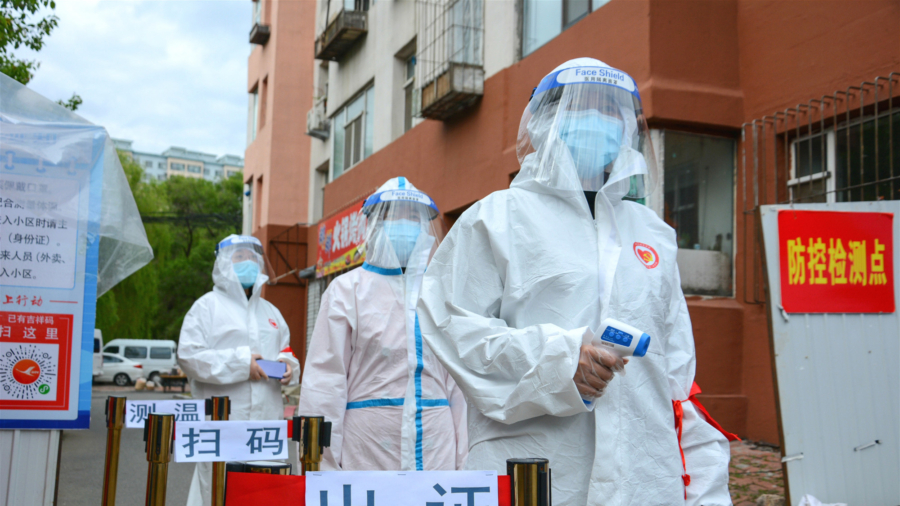A new CCP virus outbreak in Dalian city, northeastern China has spread to at least six cities and counties in three provinces since authorities confirmed a cluster of infections earlier in the week.
It remains difficult to gauge the true scale of the outbreak in the three provinces—Liaoning, where Dalian is the capital; Heilongjiang; and Jilin—given Chinese authorities’ track record of underreporting cases and concealing information.
Dalian municipal authorities reported on its website 13 new confirmed cases in Liaoning as of end of day July 25. Among these new cases, 12 were asymptomatic carriers in Dalian and one carrier in Tieling, a city located about 260 miles northeast of Dalian. The Chinese regime counts them in a separate category from those who exhibit symptoms.
But the authorities’ swiftness in enacting strict isolation measures have led locals to suspect that the outbreak was more severe than officially reported.
The city government first announced a new infection case in the latest outbreak on July 23. The following day, it said that 15 new asymptomatic cases were diagnosed by the end of day Thursday.
Dalian officials also announced that the city of about 6.9 million, would be placed under a “wartime state” in order to prevent the spread of the CCP (Chinese Communist Party) virus, commonly known as the novel coronavirus.
The Dalian Metro also required that all passengers be tested for the virus before boarding at stations along one of its three lines.
Despite the tough measures, the virus has spread out of Dalian and infected people elsewhere. On Friday, municipal authorities in Anshan city, located about 170 miles northeast of Dalian, reported a newly infected female patient surnamed Gao.
Gao came into contact with infected people in Dalian and returned to Anshan on July 17, and was confirmed positive on July 24 after two tests, according to the Anshan government website.
On Sunday, the municipal government in Tieling reported that a 55-year-old infected woman surnamed Wang, who worked at a food processing company in Dalian, was being isolated for treatment at a local hospital.
Wang came into contact with an infected coworker and returned to her home in Tienling on July 21. Her infection was confirmed on Saturday.
The virus has also spread to the nearby province of Jilin, and Heilongjiang Province further north.
The provincial health commission in Heilongjiang reported on July 24 that two local asymptomatic carriers came into contact with infected individuals in Dalian: a 48-year-old male surnamed Cai, a resident of Hegang city, Heilongjiang, who left Dalian on July 18 and returned home on July 21; and a 51-year-old woman surnamed Ding, who left Dalian on July 16 and returned home to Hailun city, Heilongjiang that same day.
Local health officials in Jilin reported two local infection cases that were traced back to the outbreak in Dalian. An infected man surnamed Zhong recently returned home to Yitong, a county in western Jilin Province, from Dalian.
Also, an unnamed woman who worked at the Dalian-based Kaiyang seafood company returned to her home in Changchun, the capital of Jilin, on July 19. She tested positive for the virus on Friday.
The Dalian city government has claimed that the seafood company was the source of the latest outbreak, saying the virus was found on the packaging of frozen seafood in cold storage. There is no evidence that the CCP virus can be spread through contaminated food.
Several locals in Dalian recently explained to the Chinese-language Epoch Times the new restrictions in place since the outbreak was announced.
A staff at the Dalian No. 2 Hospital said that incoming patients could be hospitalized only if they have tested negative for the virus.
A restaurant owner in Dalian said many stores near the Dalian Bay, where the seafood company is located, have shut down and he didn’t know when he could reopen his business.
Jiang Wen (a pseudonym), who runs a hotel near the Dalian Sports Center Stadium, said several local quarantine centers—typically where close contacts of confirmed patients are isolated and observed for any symptoms—have completely filled up.
The stadium is one of the venues for the recently opened Chinese football league (CSL), which restarted its season on July 25. CSL games are currently not open to the public.
Jiang said one of the local hotels housing CSL players was restricting personnel exiting or entering the hotel for a month before the games resumed, to ensure that the facility would not be contaminated with the virus before the players moved in.
From The Epoch Times


